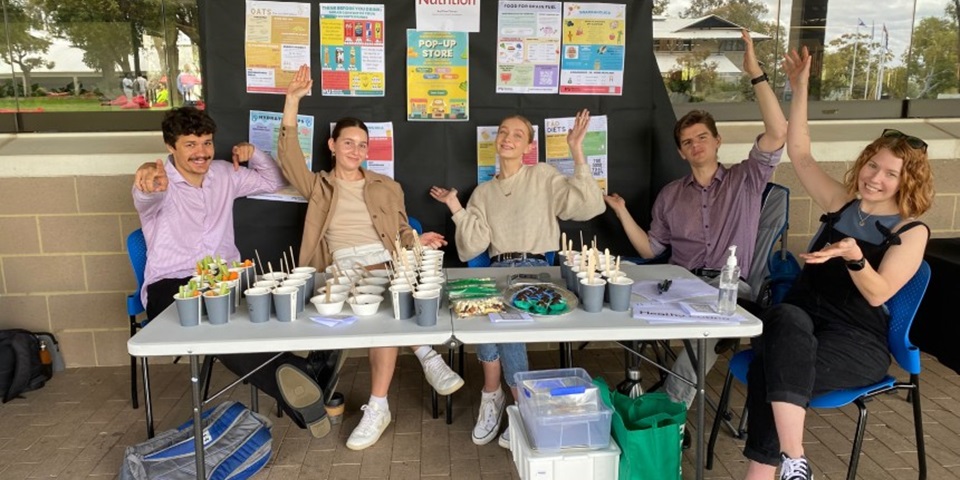News
Fuelling your body and brain for study

Studying and preparing for exams is like being an athlete. It takes training, discipline, tests of endurance endless concentration and skill, but have you ever thought about the nutrition needed to fuel your body for study?
We spoke with Murdoch University’s Food Science and Nutrition team on how to fuel your brain and body for study.
They said you can do all the training and study to get you to the exam, but ensuring you eat and drink the right things in the lead-up to an exam can be just as important.
The most important meal of the day
Breakfast is key to exam success and your brain working at its best. In fact, there is strong evidence to suggest that eating breakfast improves memory. It is true that some people do not feel like eating in the morning but once again, it is often a matter of training your stomach to take food.
Our team’s top breakfast options include:
- High-fibre cereal (Weet-bix, porridge, natural muesli, Sultana Bran, Mini-wheats) with low-fat milk and fresh fruit
- Wholegrain toast with baked beans, spaghetti, tomato or egg
- Pancakes with fresh fruit
- Fresh or tinned fruit and yoghurt
Anxiety and stress may mean your stomach is doing gymnastics on exam morning so if you can’t deal with any other breakfast options try for a banana with an Up and Go or Sustagen drink. Avoid arriving at an exam with an empty petrol tank.
Big meals vs grazing
Mid-morning is the ideal time to take a physical and mental break. Your lifestyle will determine whether you are a three-meal-per-day person or a ‘grazer’.
Our teams top snacks to keep you alert and awake include:
- 200g tub of low-fat yoghurt
- Fruit bread
- Toast or crumpet with a light spread of peanut butter or vegemite
- Fruit Smoothie
- Crackers with cheese
Caffeine
We recommend avoiding caffeine to keep you alert and awake. Caffeine stimulates every organ in your body and in small doses can be a useful study tool but too much can mean over-stimulation of your nervous system, increased heart rate and erratic sleep patterns.
Boosting Brainpower
Omega-3 fats are known to boost brainpower and should be an essential part of every student’s diet. Fish, shellfish and fish oils are good dietary sources of these fats and are found in particularly ‘oily’ fish such as herring, mackerel, sardines and salmon. Canned, fresh or frozen fish are all good sources of omega-3 fats. You should try to include them two/three times per week.
Bugs
Probiotics are foods or supplements that contain live beneficial bacteria (bugs) that keep your gut healthy. Exam stress is one thing that can upset the intestinal balance and probiotics may be especially useful during this time. There are a number of sources of probiotics including liquids, yoghurts, capsules and powders. Yakult is one of the leading products on the market and can be found in the dairy section of the supermarket. Just drink one every morning for a boost.
Pump the Iron
Iron is essential for getting enough oxygen around your body and this is obviously important during study and exam time! The best sources are liver, lean red meat, breakfast cereals and legumes (baked beans, chickpeas, kidney beans etc) and to a much lesser extent chicken, fish and leafy green vegetables. We recommend combining foods rich in iron with some fruit or vegetables, which contain Vitamin C will help with the absorption of iron.
Liquid refreshment
Don’t forget to drink plenty of fluids while studying to avoid brain drain. There are no rules that say you have to drink eight glasses of water every day or else but regular intake is the key. Water will always be the best choice but you might mix this up with some coffee, tea or Milo for a change in pace. Avoid getting stuck into sugary drinks like soft drinks, cordials and energy drinks, sure you will get a blood sugar boost, but they will get smacked back down again quick smart.
If you’ve made good food choices throughout the day you will arrive at the 3pm time slot feeling energised and ready to tackle the final quarter of the day. If not, your brain and body might want to rest or start looking for the lolly jar.
Understanding the impact of food and nutrition on the body can help when it comes to making healthier life choices and encouraging others to do so too, just like Tahlia. If you’re a passionate sportsperson or athlete fuelling the body with the right food and nutrition can improve sports performance and cognitive performance, just like it does when it comes to studying. Not only this but understanding the chemistry of food and its nutritional benefits can help with illness prevention.
If you’re interested in food, science, nutrition and improving and educating society on the power of food and nutrition, explore our new Food Science and Nutrition course.